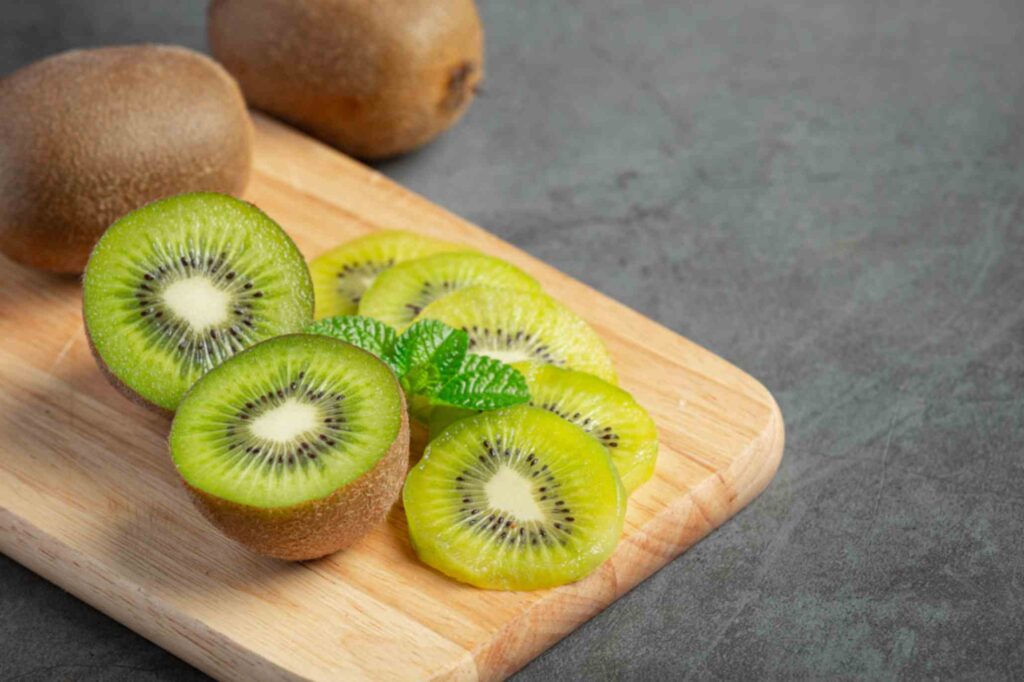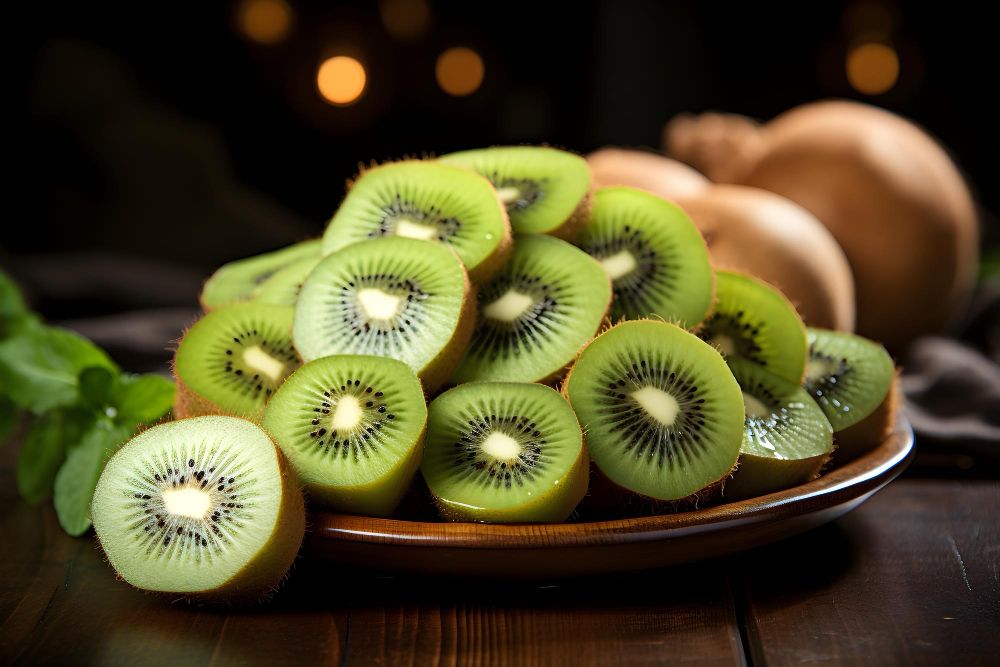Kiwi, also known as the Chinese gooseberry, is a small, fuzzy fruit..It is a small, round or oval fruit known for its distinctive appearance and vibrant green flesh speckled with tiny black seeds. It’s not only delicious but also packed with nutrition and health benefits.
Properties of Kiwi
Size and Shape: Kiwi fruit is typically about the size of a large egg, measuring approximately 2 to 3 inches (5 to 7.5 centimeters) in length. It has an oval or slightly oblong shape.
Skin: The outer skin of a kiwi is brown and covered in fine, fuzzy hairs, similar to the texture of peach skin. It is entirely edible but is often removed before consumption.
Flesh Color: The flesh of kiwi fruit is a vibrant, emerald green color. Some varieties may have golden or yellow flesh.
Seeds: Kiwi fruit contains numerous tiny black seeds that are edible and add a slight crunch to the fruit.
Texture: The texture of kiwi flesh is soft, juicy, and slightly creamy, with a refreshing, sweet-tart taste.
Flavour: Kiwi fruit has a unique flavor profile, often described as a blend of sweet, tropical notes with a tangy twist.
Varieties of Kiwi:

While the most common type of kiwi is the green kiwi (Actinidia deliciosa), there are several other varieties, including:
Gold Kiwi: This variety has golden or yellow flesh and a slightly sweeter taste than green kiwis.
Baby Kiwi (Hardy Kiwi): These are smaller kiwi varieties with smooth, edible skin. They are often eaten whole, similar to grapes.
Red Kiwi: A relatively rare variety with reddish flesh and a unique flavor.
Nutritional Content:
Kiwi is known for its impressive nutritional profile. It is an excellent source of:
Calories: 61 calories
Carbohydrates: 15 grams
Dietary Fiber: 3 grams
Sugars: 9 grams
Protein: 1.1 grams
Fat: 0.5 grams
Vitamin C: Kiwi is one of the richest dietary sources of vitamin C, providing more than 100% of the daily recommended intake in just one fruit. Vitamin C is essential for a healthy immune system, skin, and overall health.
Vitamin K: It contains vitamin K, important for blood clotting and bone health.
Fiber: Kiwi is high in dietary fiber, aiding in digestion and promoting a feeling of fullness.
Vitamin E: It contains vitamin E, an antioxidant that helps protect cells from damage caused by free radicals.
Potassium: Kiwi is a good source of potassium, which plays a role in regulating blood pressure and maintaining proper muscle and nerve function.
Folate: It provides folate, an essential nutrient for cell division and the formation of DNA.
Antioxidants: Kiwi is rich in various antioxidants, including carotenoids and polyphenols, which help combat oxidative stress and inflammation in the body.
Health Benefits:
Consuming kiwi regularly can have several health benefits:
Immune Support: The high vitamin C content in kiwi supports the immune system, helping the body fight off infections.
Digestive Health: The fiber in kiwi promotes regular bowel movements and can aid in preventing constipation.
Heart Health: The combination of fiber, potassium, and antioxidants in kiwi may contribute to lower blood pressure and reduced risk of heart disease.
Eye Health: Kiwi contains lutein and zeaxanthin, which are important for eye health and may help protect against age-related macular degeneration.
Skin Health: The vitamin C and vitamin E in kiwi promote healthy skin by protecting against UV damage and aiding in collagen production.
Asthma Management: Some studies suggest that kiwi consumption may help reduce the incidence and severity of asthma symptoms.
what are the culinary uses of Kiwi
1. Fresh Fruit Snack:
Enjoy kiwi as a healthy and refreshing snack by simply peeling and eating it whole or cutting it into slices.
2. Fruit Salad:
Add diced kiwi to fruit salads for a burst of color and flavor. It pairs well with other fruits like strawberries, pineapple, and oranges.
3. Smoothies:
Kiwi is a fantastic addition to smoothies. Blend peeled kiwi with other fruits, yogurt, and your choice of liquid (e.g., milk, juice, or water) for a nutritious and flavorful drink.
4. Kiwi Salsa:
Create a unique salsa by combining diced kiwi with ingredients like tomatoes, red onion, cilantro, lime juice, and a touch of salt. This kiwi salsa is excellent for serving with grilled chicken, fish, or tortilla chips.
5. Desserts:
Kiwi can be used in various dessert recipes, including:
Fruit Tarts: Top fruit tarts or pies with kiwi slices for added color and flavor.
Pavlova: Kiwi makes a beautiful topping for pavlova, a meringue-based dessert.
Ice Cream: Dice kiwi and use it as a garnish for ice cream or gelato.
6. Parfaits:
Layer kiwi slices or cubes with yogurt and granola to create a delicious and visually appealing parfait.
7. Sorbet:
Puree peeled kiwi with a sweetener like honey or sugar, freeze the mixture, and churn it in an ice cream maker to create homemade kiwi sorbet.
8. Jam and Preserves:
If you have an abundance of ripe kiwis, make kiwi jam or preserves by cooking them down with sugar and pectin.
9. Cocktails and Mocktails:
Kiwi can be muddled or blended into cocktails and mocktails to infuse them with a tropical flair. It pairs well with spirits like vodka, rum, and tequila.
10. Kiwi Dressings and Sauces: – Puree kiwi and combine it with other ingredients like lime juice, honey, and olive oil to create a flavorful salad dressing or sauce for grilled meats.
11. Kiwi in Breakfast: – Add kiwi slices to your morning cereal, oatmeal, or yogurt for a nutritious and colorful start to your day.
12. Kiwi Lollipops: – Insert popsicle sticks into kiwi slices and freeze them for a fun and healthy treat, especially for kids.
13. Kiwi Garnish: – Kiwi slices or wedges can be used as an attractive and edible garnish for a wide range of dishes and beverages, including cocktails, mocktails, and desserts.
14. Chutney: – Kiwi chutney can be made by simmering diced kiwi with sugar, vinegar, and spices. It pairs well with grilled meats, cheese, or as a condiment for Indian dishes.
With its versatility and unique flavor, kiwi can enhance the taste and presentation of various dishes, whether they’re sweet or savory. Experiment with kiwi in your recipes to discover new and exciting culinary combinations.
Side Effects Of Kiwi

1. Allergic Reactions:
Oral Allergy Syndrome (OAS): Some people may experience symptoms of oral allergy syndrome when consuming kiwi. OAS typically involves itching and mild swelling of the mouth, lips, and throat. It is more common in individuals who are allergic to pollen, particularly birch pollen. These symptoms usually occur shortly after eating kiwi and are generally mild.
2. Skin Reactions:
Contact Dermatitis: Handling kiwi, especially the skin, can lead to contact dermatitis in individuals who are sensitive to the fruit. This can result in skin redness, itching, or a rash.
3. Gastrointestinal Discomfort:
Digestive Upset: Some people may experience gastrointestinal discomfort after eating kiwi, including symptoms like bloating, gas, or diarrhea. This is more likely to occur if someone consumes kiwi in excessive quantities.
4. Kidney Stones:
Oxalate Content: Kiwi contains oxalates, which are compounds that can contribute to the formation of kidney stones in susceptible individuals. Those with a history of kidney stones may want to limit their oxalate intake.
5. Drug Interactions:
Blood-Thinning Medications: Kiwi has vitamin K, which plays a role in blood clotting. People taking blood-thinning medications, such as warfarin, should consume kiwi in moderation and maintain consistent dietary habits to avoid potential interactions.
6. Hypersensitivity:
Some individuals may have hypersensitivity to kiwi, which can result in various allergic reactions. These can range from mild symptoms like itching and hives to severe reactions like anaphylaxis, a potentially life-threatening condition that requires immediate medical attention.
It’s important to note that allergic reactions to kiwi, while possible, are relatively rare. Most people can enjoy kiwi as part of a healthy diet without any adverse effects.
If you suspect you have a kiwi allergy or experience any severe symptoms after consuming kiwi, such as difficulty breathing or swelling of the face and throat, seek immediate medical attention.
As with any food, it’s essential to be aware of your own body’s response to kiwi and consume it in moderation if you have concerns about potential side effects. If you have a known allergy to kiwi or other fruits, consult with a healthcare professional or allergist for guidance on managing your diet and potential allergen exposures.
Selecting and Storing:
When selecting kiwi fruit, choose ones that are slightly soft to the touch but not overly mushy. Ripe kiwis will yield to gentle pressure.
Unripe kiwis can be left at room temperature until they ripen, and then they can be stored in the refrigerator to extend their shelf life.
Debunk Myths
Myths and misconceptions about kiwi fruit can sometimes lead to confusion about its benefits and potential drawbacks. Let’s debunk some common myths about kiwi:
1. Myth: Kiwi is High in Sugar and Should Be Avoided by Diabetics: While kiwi does contain natural sugars, it has a relatively low glycemic index (GI), meaning it has a minimal impact on blood sugar levels. In fact, kiwi can be a healthy option for individuals with diabetes when consumed in moderation as part of a balanced diet.
2. Myth: Kiwi Skin is Inedible:
Debunked: Kiwi skin is entirely edible and contains additional dietary fiber, vitamins, and antioxidants. However, some people prefer to peel kiwi due to its slightly fuzzy texture. Whether you eat the skin or not is a matter of personal preference.
3. Myth: Kiwi Seeds are Harmful if Swallowed:
Debunked: Kiwi seeds are tiny and completely safe to eat. In fact, they are a good source of dietary fiber and healthy fats. Swallowing kiwi seeds will not cause any harm.
4. Myth: Kiwi is High in Calories:
Debunked: Kiwi is relatively low in calories. One medium-sized kiwi contains about 61 calories, making it a healthy and low-calorie snack option.
5. Myth: Kiwi Causes Allergic Reactions in Everyone:
Debunked: While some individuals may be allergic to kiwi and experience allergic reactions, such as oral allergy syndrome, not everyone is allergic to this fruit. Allergies to kiwi are relatively rare, and many people can enjoy kiwi without any adverse effects.
6. Myth: Kiwi is a Citrus Fruit:
Debunked: Kiwi is often mistaken for a citrus fruit due to its high vitamin C content and tart flavor. However, it is not classified as a citrus fruit. Kiwi belongs to the genus Actinidia, and its botanical name is Actinidia deliciosa.
7. Myth: Kiwi is a Superfood That Can Cure Diseases:
Debunked: While kiwi is a nutritious fruit with many health benefits, it is not a magical cure for diseases. A balanced diet and a healthy lifestyle are essential for overall well-being, and no single food can replace the importance of a varied diet.
8. Myth: Kiwi is Only Good for Vitamin C:
Debunked: While kiwi is indeed an excellent source of vitamin C, it offers a wide range of other nutrients, including vitamin K, dietary fiber, potassium, antioxidants, and phytonutrients. Its nutritional profile extends beyond just vitamin C.
9. Myth: Kiwi Should Not Be Consumed During Pregnancy:
Debunked: Kiwi is generally safe to eat during pregnancy as long as it is washed thoroughly and consumed in moderation. In fact, it can be a good source of essential nutrients like folate, vitamin C, and dietary fiber for expectant mothers.
In conclusion, kiwi is a nutritious and delicious fruit with many health benefits. While it may not be a cure-all for every ailment, it can certainly be a valuable addition to a balanced and varied diet. If you have specific concerns about kiwi or allergies, it’s always a good idea to consult with a healthcare professional.













